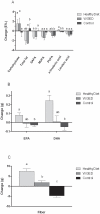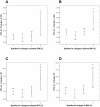Whole grain products, fish and bilberries alter glucose and lipid metabolism in a randomized, controlled trial: the Sysdimet study
- PMID: 21901116
- PMCID: PMC3161986
- DOI: 10.1371/journal.pone.0022646
Whole grain products, fish and bilberries alter glucose and lipid metabolism in a randomized, controlled trial: the Sysdimet study
Abstract
Background: Due to the growing prevalence of type 2 diabetes, new dietary solutions are needed to help improve glucose and lipid metabolism in persons at high risk of developing the disease. Herein we investigated the effects of low-insulin-response grain products, fatty fish, and berries on glucose metabolism and plasma lipidomic profiles in persons with impaired glucose metabolism.
Methodology/principal findings: Altogether 106 men and women with impaired glucose metabolism and with at least two other features of the metabolic syndrome were included in a 12-week parallel dietary intervention. The participants were randomized into three diet intervention groups: (1) whole grain and low postprandial insulin response grain products, fatty fish three times a week, and bilberries three portions per day (HealthyDiet group), (2) Whole grain enriched diet (WGED) group, which includes principally the same grain products as group (1), but with no change in fish or berry consumption, and (3) refined wheat breads (Control). Oral glucose tolerance, plasma fatty acids and lipidomic profiles were measured before and after the intervention. Self-reported compliance with the diets was good and the body weight remained constant. Within the HealthyDiet group two hour glucose concentration and area-under-the-curve for glucose decreased and plasma proportion of (n-3) long-chain PUFAs increased (False Discovery Rate p-values <0.05). Increases in eicosapentaenoic acid and docosahexaenoic acid associated curvilinearly with the improved insulin secretion and glucose disposal. Among the 364 characterized lipids, 25 changed significantly in the HealthyDiet group, including multiple triglycerides incorporating the long chain (n-3) PUFA.
Conclusions/significance: The results suggest that the diet rich in whole grain and low insulin response grain products, bilberries, and fatty fish improve glucose metabolism and alter the lipidomic profile. Therefore, such a diet may have a beneficial effect in the efforts to prevent type 2 diabetes in high risk persons.
Trial registration: ClinicalTrials.gov NCT00573781.
Conflict of interest statement
Figures




References
-
- Anderson JW. Whole grains protect against atherosclerotic cardiovascular disease. Proc Nutr Soc. 2003;62:135–142. - PubMed
-
- Laaksonen DE, Toppinen LK, Juntunen KS, Autio K, Liukkonen KH, et al. Dietary carbohydrate modification enhances insulin secretion in persons with the metabolic syndrome. Am J Clin Nutr. 2005;82:1218–1227. - PubMed
-
- Mellen PB, Walsh TF, Herrington DM. Whole grain intake and cardiovascular disease: a meta-analysis. Nutr Metab Cardiovasc Dis. 2008;18:283–290. - PubMed
-
- He K, Song Y, Daviglus ML, Liu K, Van Horn L, et al. Accumulated evidence on fish consumption and coronary heart disease mortality: a meta-analysis of cohort studies. Circulation. 2004;109:2705–2711. - PubMed
-
- Breslow JL. N-3 Fatty Acids and Cardiovascular Disease. Am J Clin Nutr. 2006;83:1477S–1482S. - PubMed
Publication types
MeSH terms
Substances
Associated data
LinkOut - more resources
Full Text Sources
Medical

